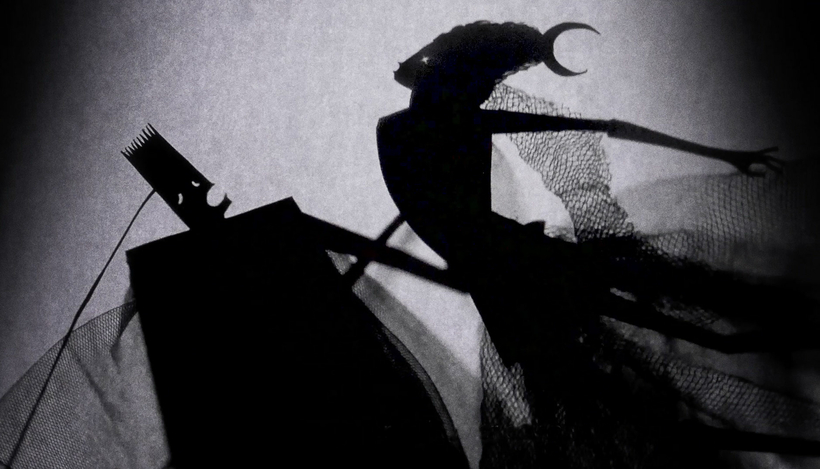Make do. Be brief. Keep your distance. With Igor Stravinsky’s Œdipus Rex, first performed in Paris in 1927, observing these emergency commandments for performances over the last year is easier than with Aida, say, or La Bohème, or Carmen. Set to Jean Cocteau’s adaptation of the Sophocles tragedy, Stravinsky’s “opera-oratorio” runs a tight, contact-free 50 minutes. Even so, it took crackerjack craftsmanship to assemble the Los Angeles Opera’s new streaming version, which alternates film clips from separate recording sessions for the multi-tracked orchestra, soloists, and chorus with “through-composed” shadow puppetry by the Emmy-winning boutique production company Manual Cinema.
As in Sophocles, the key incidents of the tragedy take place either in the past or offstage. But this time, the hero’s whole history passes in pictures before our eyes. We see him abandoned as an infant. We see him kill his father and marry his mother, just as the oracle foretold. And in the now, we witness the horrors the oracle failed to foretell: the queen’s suicide by hanging, the king’s piercing of his own eyes with the dead woman’s hairpins. Who could look away?

Throughout, a silhouetted human hand—always present, not always revealed—does the work of Fate, flicking a victim with a finger, pulling strings on another, pushing a third toward disaster with a toothpick. Between principals and chorus, the puppets number in the dozens if not the hundreds. They are cardboard cutouts, nothing more, simple in design, even crude, but primal, supercharged with the voltage of myth.
The bravura title role falls to the Black tenor Russell Thomas, coming into his prime in his mid 40s. His triumphs to date have ranged from the eponymous emperor in Mozart’s La Clemenza di Tito, for which his instrument and technique are just the ticket, to the hero of Verdi’s Otello, for which—as Thomas knows full well—they are not, however expedient impresarios find it that he looks the part.

As Œdipus, Thomas cuts deep, unfazed by Stravinsky’s contradictory challenges. He has the flexibility for the opening scene, which finds the vainglorious conqueror of the Sphinx warbling at the plague-ravaged Thebans (“my children”) in florid, only-I-can-fix-it arabesques. As rage and denial and insecurities take over, Thomas has the colors to paint the character’s grim bluster, his jitters, and honeyed pathos en route to shell-shocked self-recognition.
Jocasta, the queen, takes a swifter journey, sweeping on in a blaze of majesty only to stagger away in panic as the cyclone bears down on her royal house of cards. Radiant in black lace set off by diamond earrings, her microbraids a pouring Nile, the poised Black mezzo-soprano J’nai Bridges brings to her scene a touch of classic Hollywood glamour. Find this lady a red carpet.
As always with this strange work, self-conscious archaisms devolve at times to the arch. As the composer wished, the musical numbers are sung in a “monumental” (read highfalutin) Latin translation of Cocteau’s French, with intermittent, purposely snooty narration in the language of the audience. The English actor and television personality Stephen Fry, in whose mouth butter would not melt, does the talking here, impeccably. There’s a directorial credit for Matthew Diamond, who, be it said to his praise, has left no noticeable fingerprint. James Conlon, the Los Angeles Opera’s music director conducts with a taut hand, revealing the light and shade of the score in its full cosmopolitan glitter.
Œdipus Rex will be available for streaming on the L.A. Opera Web site through July 18
Matthew Gurewitsch writes about opera and classical music for AIR MAIL. He lives in Hawaii

